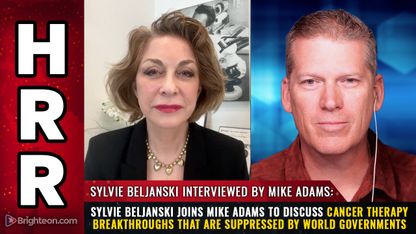
The easiest way to understand what I'm about to reveal is to first get your head around the idea that anything which is dollar denominated will of course vanish when the dollar collapses. If you have a common "checking account" at your bank, that checking account is dollar denominated. The same is true for a savings account, or a pension fund, or even a whole life insurance policy.
The dollar is fiat currency, and like all fiat currencies, it will eventually collapse into worthlessness. By definition, this means that all dollar-denominated assets will also collapse at the same time. Logically, the first step to surviving such a catastrophic financial event -- which is inevitable -- is to trade dollars for stores of wealth that are not dollars.
What are reliable stores of wealth, then? What assets will hold value and not lose value when the dollar collapses?
It's a fairly shortly list. Do all the research you want, but it comes down to just a few key things:
gold, silver, land and certain collectibles such as stamps, art or firearms.
Almost anything else can vanish, including corporate stocks, municipal bonds, pensions, etc.
Some people might say, "What about Bitcoin or other cryptocurrencies?" They are no more real than the digital infrastructure on which they exist. When the power grid goes down, all cryptocurrency instantly becomes worthless. Crypto has real value when the grid is working, however, and it's great for ferreting assets out of a collapsing nation like Venezuela, but when the full wave of s##t hits the fan, you don't want to be left holding cryptocurrency on a thumb drive when there's no working computer in sight.
You'd much rather have gold. Not gold stocks, gold futures or gold that's sitting in someone else's vault somewhere... I'm talking about physical gold in your hands.
But gold skeptics say, "How do you hold onto your gold and prevent it from being stolen?"
And that's the question that's surprisingly easy to answer, which I shall do here. It's easier than you think.
Don't store physical gold in a safe in your house... that's the first thing that thieves will target
First, you obviously don't store gold in a safe in your house, because people can force you at gunpoint to give up that gold. It's not a bad idea, however, to have fake gold coins in a safe as a decoy, just in case you are subjected to such a situation when law and order completely collapses. You can actually buy fake gold coins on Amazon. They're called "metal pirate coins" and you can pick up 50 of them for about $16. See this link. Fill your safe with these, and invent some amazing story about how your uncle was a treasure hunter and willed the coins to you... or something. The point is, these fake gold coins are a decoy to fool thieves and looters.
Oh, and by the way, most home "safes" can be defeated in about two minutes. They aren't even really safes. They're just props that are dressed up to resemble real safes. If you want a real safe, you need to purchase it from a company like BrownSafe.com that makes actual, high-security safes which frustrate safe crackers (which is not a racial slur, you honkeys).
So if the "gold" in your safe isn't your real gold, where's the real gold, you might ask?
It's simple.
As in, stupidly simple.
First, go to your local hardware store (or buy online at Amazon or elsewhere) and purchase some stepping stone concrete molds.
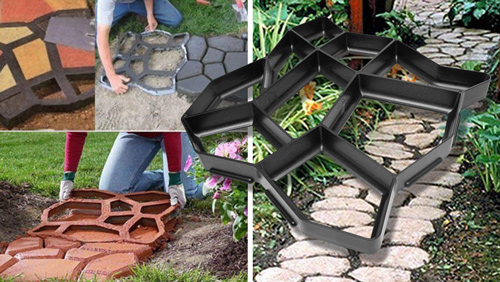
You can get these on Amazon at this link, or better yet, buy them locally.
These types of devices help you quickly create concrete walking paths in your own yard, using ready mix concrete.
Next, pick up some short pieces of rebar. They should be short enough to fit inside the stepping stone molds so they can be placed there when you pour the ready mix concrete. You can buy rebar at a local hardware store, too. If you need to cut them, get a metal cutting blade for your chop saw or grinder.
Now, all you're going to do is pour a series of concrete stepping stones, placing one piece of rebar inside each one so that the rebar is embedded in the concrete. This serves two purposes: 1) It makes the stepping stones stronger and less likely to break, and 2) It makes EVERY stepping stone light up on a metal detector, since there's hard metal inside each one.
To make sure the rebar (and your gold) are lifted off the ground as you pour the concrete, you'll also need items called "rebar chairs," which are small plastic lift supports for rebar. Technically, you can use any similar piece of plastic that achieves the same goal.
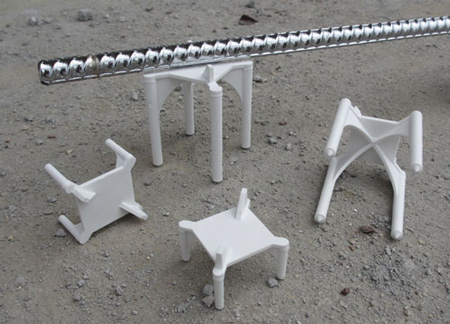
As you're preparing to pour these stepping stones, you'll place gold bars (or plastic containers filled with gold coins) inside every nth stone, depending on what makes sense to you. Maybe you have gold in every 4th stone, or every 9th. Pick a number that means something to you, and pick a simple way to number the stones. Or maybe just use large, single-step concrete molds so that the stepping stones are easily numbered. (In the worst case, if you forget which stones have the gold, you can break them all to recover the gold.)
For obvious reasons, make sure you carry out this activity away from the curious eyes of your neighbors. You can also, if you wish, spray paint your gold bars black or rust colored to hide the shiny gold color before you place them into the concrete. This helps conceal them even if one of your concrete stepping stones were to crack or break. Another viable variation of this is to buy 1/10th ounce gold coins which usually come in a hard plastic container. Paint the container black, then drop it into the concrete pour, supported by a rebar chair (to keep it off the bottom of the concrete stone).
Don't worry about directly spray painting gold bars: It's easy to remove paint from gold. You can do it using paint strippers (solvents) such as turpentine, or methanol or even just straight gasoline in a pinch (warning, gasoline is of course explosive and toxic, so this would be a SHTF last-ditch approach you should never attempt if you have a different choice). There are even citrus-based solvents made from orange peels that do the trick. The name of the molecule that accomplishes this is "D-Limonene" and it's readily available from online retailers. Since gold is almost entirely inert, none of these paint thinners will damage the gold, which is one the reasons gold has such intrinsic value, by the way.
After a few weekends of work embedding gold bars or rolls of gold coins into concrete stones, you will have a line of stepping stones that contains your hidden gold. The most important rule in doing this is the first rule of fight club: You do not talk about fight club.
Don't talk about where you've put your gold, dumb ass
Don't tell anyone there's gold in your stepping stones, in other words. If you do, you've just basically forfeited all the gold, since the very idea of you putting gold into a bunch of stepping stones will be the most intriguing and viral gossip anybody has heard in a long time, and word will spread like wildfire. Before long, your stepping stones will begin to disappear in the middle of the night, and you will curse your loose lips for sinking ships.
The only reason I'm telling you all this, by the way, is because I don't have any stepping stones filled with gold. I have another method that's even more bizarre and almost hilarious, but you'll just have to guess what that is.
Now, in the future, when you need to access your gold, you simply take a sledge hammer to your stepping stones. The concrete will crumble away, revealing your gold bars (or containers of gold coins). Protected by the concrete, your gold bars will last essentially forever. And they can always be reclaimed any time you need them, with relatively little effort (it's easier to BREAK concrete stepping stones than it is to MAKE them).
Consider the advantages of this approach to preserving wealth:
- If someone breaks into your home and tries to empty your safe, they will never suspect you have gold poured into the concrete in the stepping stones in your back yard.
- You are hiding the gold right out in the open, on a path you actually walk on, which means it is impossible for you to forget where you put the gold. It's right under your feet, and you don't need a "secret treasure map" to remember where you buried your gold.
- Concrete stepping stones cannot burn or melt. They can, however, be swept away in extremely severe flooding, so don't live in a flood zone.
- Concrete stones are impervious to weather and last more than a lifetime.
- If you have to evacuate your own property and come back later to shoot the invaders and reclaim your house, chances are they will never touch the concrete stones in your back yard. So your gold will still be there.
- If someone checks your yard with a metal detector, they will first find REBAR in the concrete stones, which makes sense, since there's rebar in most concrete. Besides, no treasure hunter will think you've hidden your gold in plain sight. They will waste their time trying to scan areas of your ground that seem more hidden from public view. If you want to frustrate them even more, go buy a bunch of cheap flatware (spoons, mostly) and scatter them all across your yard. After a year or so, they will be buried beneath the grass, creating an array of metal chaff that will frustrate even the most determined treasure hunter. You can also scatter large washers and other harmless metal parts that don't contain sharp edges, just in case your grandchildren like to walk barefoot around your yard.
Start thinking about what you can pour into concrete shapes
I'm giving you the example of concrete stepping stones here to make a simple point: You can pour all sorts of concrete objects that can contain gold coins or bars inside them, ready to be freed in the future with a sledge hammer. You can pour a concrete sitting bench, or a concrete bird bath. Maybe you need a concrete set of stairs for your single wide, or a concrete yard decoration. Anything you can pour with concrete can be embedded with gold bars and rebar. It's simple, permanent and practically theft-proof. Who steals heavy concrete objects? Nobody. They look for compact, high-density valuables like jewelry and gold coins.
You may have also figured out that you can hide firearms this way, too. You can literally hide your legal handgun inside a concrete wall, and it will last essentially forever.
The only disadvantage to this approach? You'll need a sledgehammer to make a withdrawal. But so what?
Here's a fun tip: You can mix the concrete with styrofoam bits to make a weaker concrete. Just take some pieces of styrofoam / polystyrene, like the ones found in a shipping box that might contain a PC or some other gear, and break them up with a hammer so that they turn into tiny bits of styrofoam. Mix that in with your concrete mix, and you have a much easier-to-shatter concrete object that also has some insulative properties. This is also called "recycling," by the way. So you can feel all green and everything.
Another variation of this approach is to buy the 8 x 16 cinder blocks sold at your local hardware store, then fill the holes of the blocks with ready mix concrete, placing your gold inside. You can then use those concrete blocks to build a smoke pit, a retaining wall, etc. Nobody goes around smashing blocks just to see what's inside, so your gold is probably safe. This technique can also be used to hide handguns that you acquired legally, but which are being retroactively banned by authoritarian, treasonous Democrats like the criminal political lunatics that run Virginia.
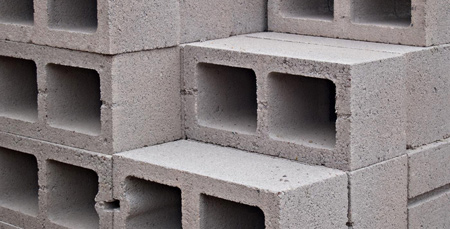
Some people even build their homes out of concrete. It's called ICF construction. And if you're clever, you could actually build gold bars into the walls, knowing exactly where to "hulk smash" the wall to reclaim your gold. This is so much smarter than hiding cash behind drywall, by the way, since cash gets eaten by mice or burned up in a home fire. (Gold cannot burn. It can melt, but that only changes its shape.)
Concrete is an amazingly versatile solution for hiding gold without having to bury it. You're hiding it right out in the open, yet making it incredibly difficult to detect or steal. Nobody will ever try to steal your home's concrete slab, for example. And yes, if you're pouring a slab, you can pour gold bars right into it. (Just remember where the heck you put the bars so that you can get them out at a future date, which will require quite a lot of work, just to be clear.)
If all this sounds like too much work, the simpler plan is to just trust the system and pretend the banks and the dollar will always function as promised. If you think hammering gold bars out of concrete is difficult, just try re-earning all money you'll lose when the dollar collapses.
Trust me, you'd much rather take the gold option.
The masses lose everything when the currency collapses; the prepared do something radically different
As the world of fiat currency collapses in the next financial apocalypse, you will be sitting on a store of real wealth that has intrinsic, permanent value: physical gold. While fiat currencies suffer inflation, value erosion and speculative whiplash, your gold will maintain roughly the same value over time, regardless of what happens with the central banks.
Meanwhile, all the sheeple who trusted the dollar will lose everything. They stupidly trusted their government -- the same government that has proven itself again and again to be morally bankrupt, financially deranged and criminally insane. Why would you bet your entire life savings on a corrupt, fraudulent government that can't even balance its own books or tell the truth on anything?
The primary disadvantage in this strategy is the lack of portability once you pour gold coins into concrete, so make sure you've decided to stay put on a piece of land before you roll out this approach. It's always a good idea to have some portable gold on hand, too, such as 1/10th ounce gold coins that fit in a bugout bag. But honestly, if things have collapsed to the point where you're a refugee with a backpack, you're in a world of hurt to begin with. Staying put is almost always a better choice than hitting the road, especially in a collapse scenario.
Where should you acquire gold? Steve Quayle's Renaissance Precious Metals is a trusted source run by patriots: www.sqmetals.com
Notice the slogan at Renaissance Precious Metals: "If you can't touch it, you don't own it."
I would also add to that, "If the thieves can't find it, they can't steal it."
In addition to buying gold, make sure you have a reliable AR-15 and know how to use it. If it's not legal to own an AR-15 where you live, you're already living under tyranny that's just begging to be dismantled and ended. Follow the law, I say, but also work to defeat the bureaucrats who violate the higher law of your constitutional rights.
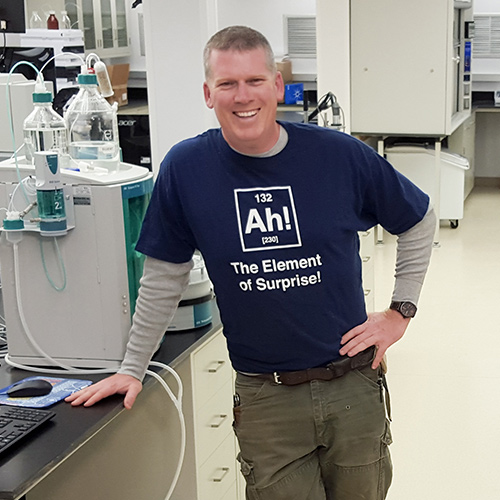
Mike Adams (aka the "Health Ranger") is the founding editor of NaturalNews.com, a best selling author (#1 best selling science book on Amazon.com called "Food Forensics"), an environmental scientist, a patent holder for a cesium radioactive isotope elimination invention, a multiple award winner for outstanding journalism, a science news publisher and influential commentator on topics ranging from science and medicine to culture and politics.
Mike Adams also serves as the lab science director of an internationally accredited (ISO 17025) analytical laboratory known as CWC Labs. There, he was awarded a Certificate of Excellence for achieving extremely high accuracy in the analysis of toxic elements in unknown water samples using ICP-MS instrumentation.
In his laboratory research, Adams has made numerous food safety breakthroughs such as revealing rice protein products imported from Asia to be contaminated with toxic heavy metals like lead, cadmium and tungsten. Adams was the first food science researcher to document high levels of tungsten in superfoods. He also discovered over 11 ppm lead in imported mangosteen powder, and led an industry-wide voluntary agreement to limit heavy metals in rice protein products.
Adams has also helped defend the rights of home gardeners and protect the medical freedom rights of parents. Adams is widely recognized to have made a remarkable global impact on issues like GMOs, vaccines, nutrition therapies, human consciousness.
Please contact us for more information.




